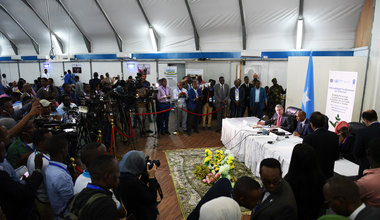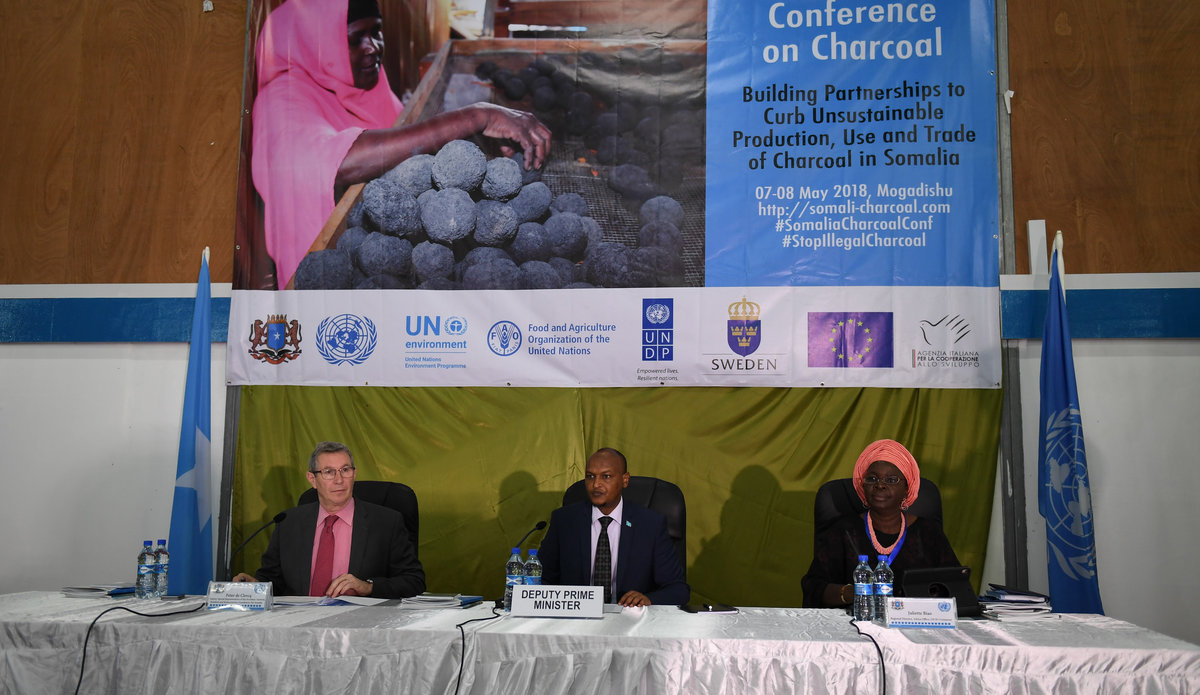International conference on illegal charcoal trade opens in Mogadishu
Mogadishu - A two-day international conference seeking to build partnerships to curb the unsustainable trade, production and use of charcoal in Somalia opened in Mogadishu today.
The conference is being held in the wake of a recent resurgence in charcoal trade, which had dropped in 2015 and 2016. The militant group Al-Shabaab has been partly blamed for the increased trade by facilitating its export to some Gulf countries from Jubbaland state.
Supported by the UN Development Programme, the UN Environment agency and the UN Food and Agricultural Organization, the conference brings together environmentalists, Federal Government of Somalia officials, diplomats, United Nations officials, and academicians who will discuss ways of curbing the charcoal trade and the destruction it inflicts on Somalia’s fragile environment.
In his opening remarks, Somalia’s Deputy Prime Minister, Mahdi Mohamed Guled, urged the international community to help the country reduce the illegal charcoal trade.
Mr. Guled noted that the Somali government had lobbied the United Nations to impose a ban on the charcoal trade in 2012 to preserve the environment and also eliminate a vital source of funding for armed groups.
“The Federal Government of Somalia is committed to reducing the charcoal consumption by identifying sustainable sources of energy to reverse the impending threat against Somalia’s fragile eco-systems,” Mr. Guled said.
The Deputy Special Representative of the UN Secretary-General and Resident Humanitarian Coordinator for Somalia, Peter de Clercq, said the production and use of charcoal has a negative impact on the country’s environment, security and economy and aggravates an already delicate humanitarian situation in the country.
“Between 2011 and 2017, 8.2 million trees were cut down to make charcoal,” observed Mr. de Clercq. “Every 30 seconds a tree is cut down to make charcoal in this country.”
“The illegal charcoal trade continues to fund insecurity and conflict. It exacerbates inter-clan tensions over control of land and trade and acts as a major source of funding for militias and terrorist groups such as Al-Shabaab, who illegally tax exports of charcoal,” he added.
Mr. de Clercq estimated that Al-Shabaab obtains $10 million every year through levies it imposes on the charcoal trade in areas of the country under its control. He also noted that the illegal trade contributes to frequent drought cycles, flooding, the loss of livelihoods and an increase in food insecurity.
The Deputy Prime Minister told a press conference there was a need to develop alternative energy systems to strengthen the ban on the charcoal trade in Somalia.
“We have natural, God-given solar energy, we also have lots of wind which can generate energy for cooking and other uses, and also gas which is cheaper to utilize,” Mr. Guled added.
Addressing journalists at the conference, Mr. de Clercq said he still sees large piles of charcoal ready for export during his travels through Somalia, raising concerns that the plunder of natural resources is worsening.

The Africa Office Director of the UN Environment agency, Juliette Biao, said the charcoal trade dates back to pre-colonial days and traditionally provided livelihoods to many families. However, she expressed concern that continued armed conflict in Somalia has fueled the illegal trade in the commodity.
“This conference will also help us to come up with a solution to see how curbing the unsustainable production of charcoal can also help to strengthen the nexus (between) health and environment,” Ms. Biao said.
According to the UN, the United Arab Emirates, Bahrain, Kuwait and Oman are major markets for Somali charcoal exports. The world body says that implementation of the 2012 ban has been poorly enforced.
 UN
UN





